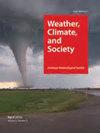Public Responses to Emergency Energy Conservation Messaging: Evidence from the 2021 Winter Storm in Norman, OK
IF 1.9
4区 地球科学
Q3 ENVIRONMENTAL STUDIES
引用次数: 0
Abstract
This study investigates if and how energy consumers respond to public appeals for voluntary conservation during an extended and extreme winter energy emergency. Public appeals are an increasingly important tool for managing demand when grid disruptions are anticipated, especially given the increase in severe weather events. We add to the few studies on winter energy crises by investigating a case where there were repeated public appeals during an extended event. Using a survey implemented via social media immediately after the February 2021 winter storm, we asked residents of Norman, Oklahoma a series of questions about their responses to the public appeals distributed by the utility company, including if they followed the actions suggested in the messages as well as where they got information and their level of concern about the storm impacts. We compare mean responses across a range of categorical answers using standard independent t-tests, one-way ANOVA tests, and Chi-square tests. Among the 296 respondents, there was a high degree of reported compliance, including setting the thermostat to 68 degrees Fahrenheit or lower (72%), avoiding using major appliances (86%), and turning off non-essential appliances, lights, and equipment (89%). Our findings suggest a high degree of willingness to voluntarily reduce energy consumption during an energy emergency. This is encouraging for energy managers: public appeals can be disseminated via social media at a low cost and in real time during an extended emergency event.公众对紧急节能信息的反应:来自2021年诺曼冬季风暴的证据
这项研究调查了在长期和极端的冬季能源紧急情况下,能源消费者是否以及如何回应公众自愿节约的呼吁。当预计电网中断时,特别是在恶劣天气事件增加的情况下,公众呼吁是管理需求的一个越来越重要的工具。在为数不多的关于冬季能源危机的研究基础上,我们调查了一个在延长活动期间多次公开呼吁的案例。利用2021年2月冬季风暴后立即通过社交媒体进行的一项调查,我们向俄克拉荷马州诺曼市的居民询问了一系列关于他们对公用事业公司发布的公众呼吁的回应的问题,包括他们是否遵循了信息中建议的行动,以及他们从哪里获得的信息以及他们对风暴影响的担忧程度。我们使用标准独立t检验、单因素方差分析检验和卡方检验比较了一系列分类答案的平均反应。在296名受访者中,报告的依从性很高,包括将恒温器设置为68华氏度或更低(72%),避免使用主要电器(86%),以及关闭非必要电器、灯和设备(89%)。我们的研究结果表明,在能源紧急情况下,自愿减少能源消耗的意愿很高。这对能源管理者来说是令人鼓舞的:在延长的紧急事件期间,公众呼吁可以通过社交媒体以低成本实时传播。
本文章由计算机程序翻译,如有差异,请以英文原文为准。
求助全文
约1分钟内获得全文
求助全文
来源期刊

Weather Climate and Society
METEOROLOGY & ATMOSPHERIC SCIENCES-
CiteScore
3.40
自引率
13.60%
发文量
95
审稿时长
>12 weeks
期刊介绍:
Weather, Climate, and Society (WCAS) publishes research that encompasses economics, policy analysis, political science, history, and institutional, social, and behavioral scholarship relating to weather and climate, including climate change. Contributions must include original social science research, evidence-based analysis, and relevance to the interactions of weather and climate with society.
 求助内容:
求助内容: 应助结果提醒方式:
应助结果提醒方式:


